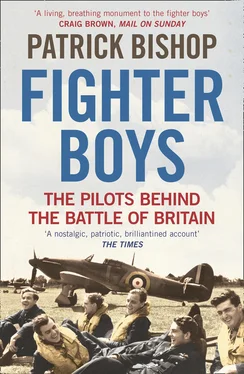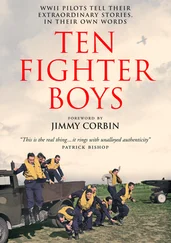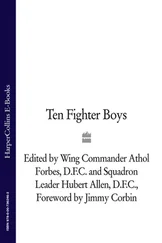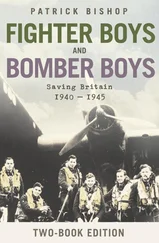Despite the peace and the nearness to family that he had yearned for when in France, he was restless and unhappy and soon agitating to go back. The pressure worked. In February he was posted to 56 Squadron, which was being formed as an élite unit to fly the new SE5 fighters against the best of the German air force. While waiting he fell in love, with an eighteen-year-old florist called Flora Young, who an old friend had brought with him when he drove over to visit him at the base. The attraction was instantaneous. He offered to take her up in an aeroplane and she gamely accepted. That night he was writing to thank her for ‘the topping day I have had with you. I am simply full of joy to have met you.’ 10On 7 April 1917 the squadron left England. Ball’s tour was supposed to be for a month only. He sent daily letters to Flora detailing his successes and setting himself a target. Once he had overtaken the German champion Oswald Boelcke, he would come home.
At 5.30 p.m. on Monday, 7 May, he lead a squadron of SE5s on an offensive sweep aimed at seeking out enemy fighters, believed to be led by the German ace Manfred von Richthofen, who were operating in the Arras area.
Cecil Lewis described the chocolate-coloured fighters flying into a ‘May evening…heavy with threatening masses of cumulus cloud, majestic skyscrapes, solid-looking as snow mountains, fraught with caves and valleys, rifts and ravines’. 11Suddenly, high over the Cambrai-Douai road, out of these clouds came the Albatross D111 scouts they were looking for. Richthofen was not among the pilots, but his brother Lothar was. The formations rounded on each other in a confused mêlée of individual combats. Lewis described how Ball ‘flew straight into the white face of an enormous cloud. I followed. But when I came out the other side, he was nowhere to be seen.’ Four German officers on the ground heard aircraft engines and looked up to see Ball’s machine slip out from low cloud upside down with its propeller stopped and trailing black smoke. It disappeared behind a stand of trees and crashed into a shoulder of farmland. By the time the officers reached the wreckage a young Frenchwoman had pulled the pilot clear. There were no marks on the fresh features, but Ball was dead.
Lothar von Richthofen claimed the victory, though no one on the British side believed him. The most likely explanation was that Ball became disoriented inside the cloud – a common hazard – and emerged to find he was flying upside down too low and too late to correct the error.
‘The mess was very quiet that night,’ Lewis wrote. They held a singsong in a nearby barn to try and raise morale. The squadron band played and the men sang the hits of the time: ‘There’s a Long, Long Trail’, ‘Way Down upon the Swanee River’, ‘Pack Up Your Troubles’. Then Lewis sang the Robert Louis Stevenson ‘Requiem’.
Under the wide and starry sky,
Dig the grave and let me lie.
Glad did I live and gladly die,
And I laid me down with a will.
A month after Ball’s death the London Gazette announced the award of a posthumous VC, noting that ‘in all Captain Ball has destroyed forty-three German aeroplanes and one balloon and has always displayed most exceptional courage, determination and skill’.
A new hero was already emerging from the ranks of the RFC by the time of Ball’s demise, a man of very different background and character. Edward ‘Mick’ Mannock had been in France for just over five weeks when Ball crashed. He knew all about him. Ball’s exploits, read about in the newspapers, had been one of the reasons he had applied to transfer to the RFC from the Royal Engineers. By the time he arrived at the main depot in St Omer he was already twenty-seven, oldish to be a pilot. He had reached the air force by an erratic route. He was born on 21 May 1889 to Irish parents. His father had been a non-commissioned officer in the Second Inniskilling Dragoons, who drank, beat his wife and disappeared, leaving her with two sons and two daughters who she brought up in poverty in Canterbury. Mannock left school at fourteen to work as a clerk. His hard early life converted him to socialism and throughout his military career he enjoyed alarming conventional comrades with his views about class and privilege. He was also an Irish nationalist.
When the war came he was working as a labour supervisor in Turkey with a cable-laying company. He was interned until the Red Cross intervened, returned to England and, with his technical background, ended up in the Royal Engineers with an ambition to be a tunnelling officer. But the training bored him and he was irritated by his fellow officers and their talk of cricket, girls and dances. No one was sorry when he applied for the RFC and went off to learn to fly, managing to bluff his way through the medical despite being blind in one eye from a childhood illness.
By the summer of 1917 the brief period of air superiority the RFC had enjoyed during the Somme offensive, when it had been operating with greater numbers of aircraft and using better tactics, was over. Once again the Germans had taken the technological lead with a new breed of Albatros aircraft grouped into Jagdgeschwaders tasked with achieving control of the sky in whichever sectors commanders selected. Richthofen lead Jagdgeschwader 1. The leading pilots painted their machines in glaring colours – blood red for Richthofen – and decorated them with ancient symbols and devices, including the swastika, which had yet to lose its innocence. Some advertised their identity in huge letters on the top wing. One had inscribed underneath his name, Kennscht mi noch? – ‘Don’t you remember me?’
On 7 June Mannock was helping to escort a bombing mission over Lille when ‘we met Huns. My man gave me an easy mark. I was only ten yards away from him so I couldn’t miss! A beautifully coloured insect he was – red, blue, green and yellow. I let him have sixty rounds at that range, so there wasn’t much left of him. I saw him go spinning and slipping down from fourteen thousand. Rough luck but it’s war and they’re Huns.’ On 19 August he ran into one of the leading German pilots, Leutnant von Bartrap, a holder of the Iron Cross. ‘He came over for one of our balloons…and I cut him off going back…The scrap took place at two thousand feet up, well within view of the whole front. And the cheers! It took me five minutes to get him to go down and I had to shoot him before he would land. I was very pleased that I did not kill him.’ 12
On other occasions he was less considerate. Caldwell remembered watching Mannock chasing a German two-seater trying to reach the safety of its own lines. ‘The Hun crashed but not badly, and most people would have been content with this – but not Mick Mannock. He dived half a dozen times at the machine, spraying bullets at the pilot and observer, who were still showing signs of life…On being questioned as to his wild behaviour after we had landed, he heatedly replied, “the swines are better dead – no prisoners for me!”’ 13
Mannock was full of such contradictions, mixing vindictiveness with bouts of remorse. He seemed to genuinely enjoy air fighting, writing about it unabashedly as ‘fun’ and ‘sport’ in the manner of the day. But he also worried constantly that he was going to crack up. Towards the end he became convinced his death would be a fiery one. It was a common sight to see an aeroplane plunging earthwards, trailing an oily wake of smoke. Fifty-five of eighty machines shot down by Richthofen were registered as gebrannt (burned). On most aircraft the fuel tank was fitted in the nose, close to the engine. In the event of fire the backwash from the propeller blew the flames into the pilot seated behind. Once an aircraft was alight there was no escape. Efficient parachutes existed but pilots were not allowed to have them. The staff view was that possession of a parachute might weaken a pilot’s nerve when in difficulties so that he abandoned his valuable aeroplane before he had to. Anyway, one general reasoned, aeroplanes went down so swiftly there was really no time to jump. 14
Читать дальше












